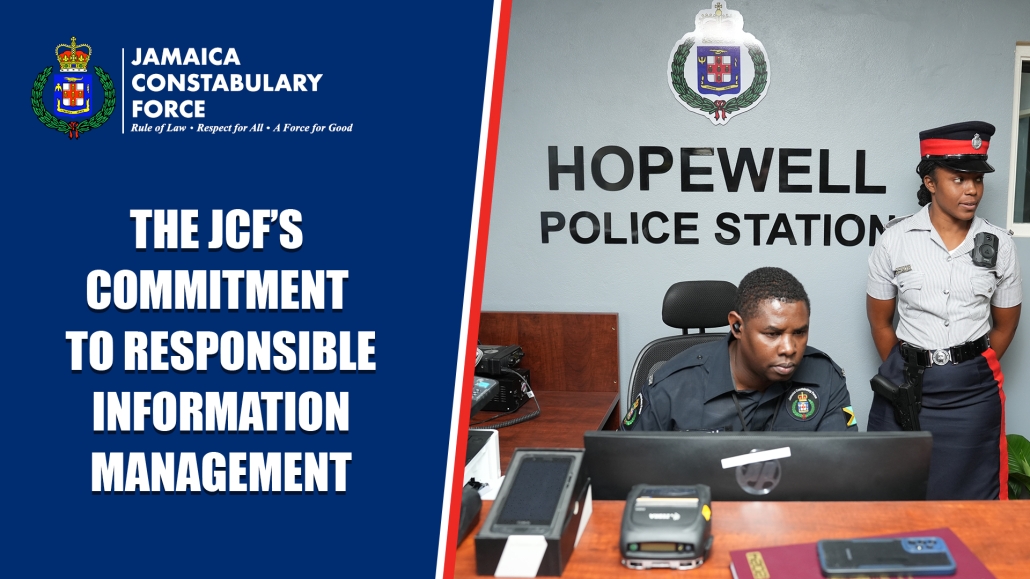
The JCF’s Commitment to Responsible Information Management
In an era where social media permeates almost every facet of daily life, managing sensitive information has become a critical issue for public organisations across the globe. Nowhere is this challenge more pronounced than within law enforcement agencies, where the integrity of information is not just an operational necessity but a matter of public trust and safety. The Jamaica Constabulary Force (JCF) finds itself at the intersection of this reality, as its members engage heavily with platforms like WhatsApp and other social media channels for routine communication. As such, it is both timely and crucial that Police Commissioner Dr. Kevin Blake raised the issue of responsible information management in this week’s Commissioner’s Corner.
The Commissioner’s words could not have been more appropriate as he directed his focus toward a subtle but essential aspect of law enforcement in the digital age: how the JCF handles its information. “As we venture more into the digital age,” Dr. Blake wrote, “how we manage the organization’s information is crucial for maintaining public trust, ensuring effective operations, and safeguarding national security.”
These words ring true at a time when the circulation of sensitive police data on social media has raised alarms, both within the Force and among the general public. Too often, highly confidential information finds its way into the public domain, shared carelessly through messaging platforms and other informal channels. For an institution that must uphold the highest standards of confidentiality, such breaches are not merely lapses in judgment—they are potential threats to the very fabric of public safety.
Dr. Blake made this point abundantly clear, warning that the mismanagement of sensitive information can do incalculable damage to the JCF’s image and operational effectiveness. “Very little does more harm to our image, reputation, and the security of the people we serve than this type of recklessness from a few among us,” he cautioned. His message could not have been more direct: breaches of confidentiality are not just ethical violations; they risk compromising ongoing investigations and, in the worst cases, could even cost lives.
This strong stance from the JCF High Command should be seen as a positive signal to the public. It underscores the organization’s commitment to safeguarding the sensitive information in its possession and reinforces the High Command’s insistence on maintaining the highest standards of professionalism. For the public, the message is clear: the JCF takes seriously its responsibility to protect both its operations and the citizens it serves from the consequences of poor information management.
One of the most significant principles the Commissioner emphasizes in his column is confidentiality. “We must always avoid the urge to share sensitive police information with unauthorized persons,” he stated unequivocally. This is a pressing issue in a world where digital communications often blur the lines between what is public and what should remain private. The proliferation of large WhatsApp groups, for instance, presents a unique challenge—one in which the dissemination of official police reports to unauthorized persons, intentionally or otherwise, is far too common. The Commissioner’s insistence that this practice “must stop forthwith” is a call to action for every member of the Force, a reminder that their responsibility extends far beyond their immediate interactions.
The second principle Commissioner Blake highlights is equally critical: integrity. In law enforcement, the integrity of information is paramount to ensuring effective operations and protecting the rights of individuals. “Our information must remain accurate, complete, and trustworthy,” Dr. Blake reminded his colleagues. When sensitive information is shared improperly, its accuracy can become compromised, and the truth of the matter obscured. The result is an erosion of trust—not just within the Force, but among the general public, who rely on the police to maintain transparency and accountability.
This is where the principle of accountability becomes crucial. As Dr. Blake points out, “We must be accountable for how we manage the information in our custody.” Information management is not merely a technical task; it is a responsibility that carries weight at every level of the organization. And while breaches of confidentiality are often traced to individual officers, the Commissioner made it clear that supervisors also bear responsibility when they fail to hold their subordinates accountable. “When a supervisor does nothing to hold that person accountable or even worse seeks to cover for the person,” he warned, “then he has transferred the liability to himself.”
In a world where the consequences of poor information management can be catastrophic, the High Command’s strong stance on this issue signals a deep commitment to upholding the highest ethical standards. “We have to carefully guard this public confidence that we now enjoy and must not allow it to be compromised by a few with poor judgment,” Dr. Blake urged. His words are a sobering reminder that trust, once lost, is difficult to regain.
For the public, Dr. Blake’s focus on responsible information management should serve as a reassurance. In a time when digital platforms make it easier than ever to share information—often without thought to the consequences—the JCF is taking decisive steps to protect the integrity of its operations. The Commissioner’s strong stance on confidentiality, integrity, and accountability reflects a broader commitment to safeguarding national security and ensuring that public safety remains the top priority.
As Dr. Blake wisely noted, “While we are free to choose our actions, we are not free to choose the consequences of our actions.” In the realm of law enforcement, those consequences are too great to ignore. The JCF has made it clear that there will be no tolerance for recklessness, and that the responsibility for protecting sensitive information is a shared one—across all ranks of the Force. The public can take comfort in knowing that the JCF’s commitment to integrity extends not just to its crime-fighting efforts, but to every piece of information it handles.







